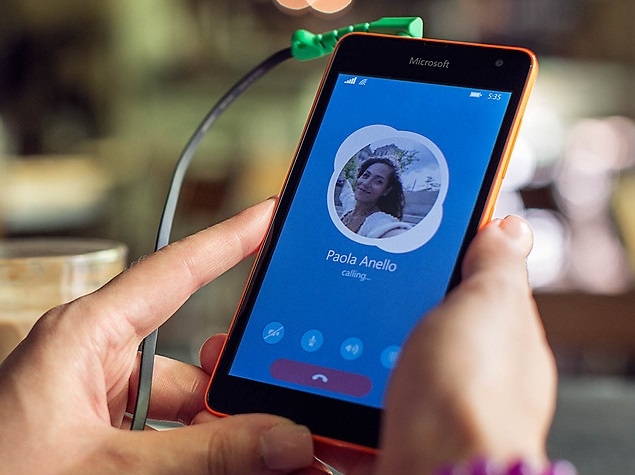- Home
- Internet
- Internet Opinion
- Five Hurdles That Stop VoIP Calling From Going Mainstream
Five Hurdles That Stop VoIP Calling From Going Mainstream

During the recent net neutrality debate and even in the past, telcos have claimed that OTT players like Facebook, WhatsApp, and Skype hurt their revenues. There's worry that the money telcos used to make on phone calls and text messages is depleting because of free instant messaging services. Although it's a no brainer than texting on WhatsApp or Google Hangouts is cheaper than doing so via SMS/ MMS, calling people over the Internet can be cheaper, even if you're on 3G.
So then why are we just not calling everybody using these popular instant messaging apps instead of dialling to them on expensive voice calls? There are a few hurdles which are stopping us from doing that today:
1. VoIP apps are second-class citizens on mobile operating systems
Have you ever been on a Facebook or Skype call, only to be interrupted by a traditional phone call? In my experience on both iOS and Android, VoIP apps are treated like second-class citizens, possibly because mobile operating systems today treat phone calls above everything else.
It is extremely irritating when you're on a VoIP call and a phone call comes in; you're forced to make a decision to either accept or reject the phone call as it takes up the entire screen and your VOIP call might also get disconnected. If you're ever making voice calls over the Internet today, be prepared for a disruptive experience.
2. 3G or Wi-Fi are practically mandatory to use VoIP
It's incredibly rare to be able to make a meaningful voice call on a 2G network in India, no matter how good the voice compression technology being used by your VoIP service is. I say this out of the experience of trying to make calls on all popular IM apps over 2G. This should have been obvious really, since in Mumbai even text-based content like a tweet mostly fails to work on 2G. And an omnipresent 3G Internet connection across the country is impossible today.
This is the problem - if I'm making a call over an instant messenger, I have no way of knowing the Internet connectivity the receiver is experiencing at that moment. This is not a problem with regular phone calls, as their reliability is (relatively) much higher than VoIP calls.
3. VoIP calls hog battery life, and cause heating
In my experience, VoIP calls tend to hog battery life more than typical phone calls. Also, when an Internet call on a smartphone lasts for over a few minutes, it tends to get warmer than it would when on a regular phone call. I wonder how many people will accept these trade-offs for cheaper voice calls?
4. Incoming calls aren't always 'free'
In India for more than a decade, we haven't paid for incoming calls to our mobile phones. That may not be the case if you're receiving an incoming call over the Internet, because data consumption happens on both ends of that call. Now, it depends whether you're on Wi-Fi or 3G, since most broadband Internet plans are virtually unlimited or have large enough limits not to be affected by the call. That is not the case for most 3G plans. So, taking a call when you're on Wi-Fi is effectively free, but over 3G you will end up paying for some data.
5. App availability and fragmentation
There are at least a dozen instant messaging apps that people I know are using - some popular ones are WhatsApp, Facebook Messenger, Viber, Skype, Hike, Google Hangouts, FaceTime, WeChat. This creates an uncertainty about which person may be available on which Internet-calling app. You can say WhatsApp could be that universal instant messenger that most of us use, but that isn't always the case. If you're on Airtel you can call an Idea user, but if you're on WhatsApp, you can't call someone on Skype. You need to start Skype yourself.
There are many benefits of calling over the internet - it's cheaper and it offers better voice clarity. Apps like Facebook Messenger and some others have useful features such as automatically reconnecting calls when you are hopping in and out of poor connectivity, so there are fewer 'call drops'. If you're making international calls, the difference in price is so great that we all willingly put up with all these hurdles to make VoIP calls. But until these issues are resolved I can't use the Internet for local calls, which should probably make the telcos a little less worried.
(Rohan Naravane oversees the Content & Product Experience at PriceBaba.com. He dreams of the day when all he will end up buying from a telecom operator is data, and nothing else.)
Disclaimer: The opinions expressed within this article are the personal opinions of the author. The facts and opinions appearing in the article do not reflect the views of NDTV and NDTV does not assume any responsibility or liability for the same.
For the latest tech news and reviews, follow Gadgets 360 on X, Facebook, WhatsApp, Threads and Google News. For the latest videos on gadgets and tech, subscribe to our YouTube channel. If you want to know everything about top influencers, follow our in-house Who'sThat360 on Instagram and YouTube.
Related Stories
- Galaxy S24 Series
- MWC 2024
- Apple Vision Pro
- Oneplus 12
- iPhone 14
- Apple iPhone 15
- OnePlus Nord CE 3 Lite 5G
- iPhone 13
- Xiaomi 14 Pro
- Oppo Find N3
- Tecno Spark Go (2023)
- Realme V30
- Best Phones Under 25000
- Samsung Galaxy S24 Series
- Cryptocurrency
- iQoo 12
- Samsung Galaxy S24 Ultra
- Giottus
- Samsung Galaxy Z Flip 5
- Apple 'Scary Fast'
- Housefull 5
- GoPro Hero 12 Black Review
- Invincible Season 2
- JioGlass
- HD Ready TV
- Laptop Under 50000
- Smartwatch Under 10000
- Latest Mobile Phones
- Compare Phones
- Oppo A1i
- Oppo A1s
- Motorola Edge 50 Ultra
- Leica Leitz Phone 3
- Moto G64 5G
- Moto G04s
- iQOO Z9 Turbo
- Vivo T3x 5G
- Asus ZenBook Duo 2024 (UX8406)
- Dell Inspiron 14 Plus
- Realme Pad 2 Wi-Fi
- Redmi Pad Pro
- Cult Shock X
- Fire-Boltt Oracle
- LG 65-inch 4K Ultra HD Smart LED TV 65UR7500PSC
- Xiaomi 32 Inch LED HD Ready Smart TV (L32M6-RA-L32M7-RA)
- Sony PlayStation 5 Slim Digital Edition
- Sony PlayStation 5 Slim
- Voltas 1.5 Ton 5 Star Inverter Split AC (185V ZAZAH+ 4503310)
- Godrej 1.5 Ton 3 Star Inverter Split AC (SIH 18ITC3-WWR)
















